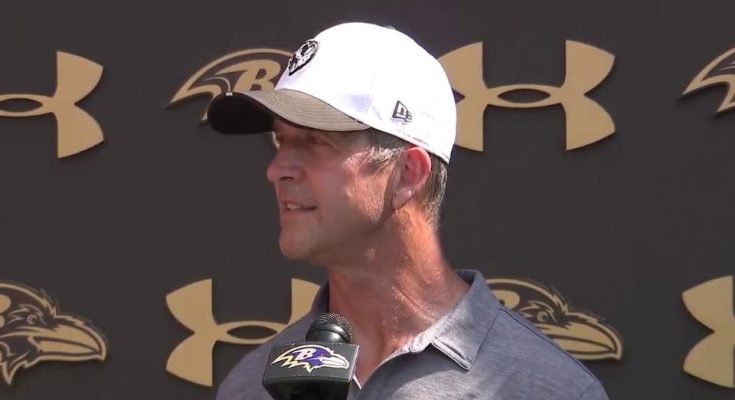John Harbaugh Claps Back at Reporter Over Trump Question: ‘I Root for Our President Like I Root for My QB’
Baltimore Ravens head coach John Harbaugh found himself in the hot seat recently when a reporter asked him a pointed question about why he met with former President Donald Trump. The tone of the question seemed designed to provoke or put Harbaugh on the defensive, but the seasoned coach wasn’t about to let that slide. Instead, he delivered a calm, confident, and heartfelt response that cut through the tension with authenticity and class.
When asked, “Why do you frame that question [like that]? … It was amazing—it was awesome. And I promise you, I root for our President. I want our President to be successful just like I want my quarterback to be successful…” Harbaugh didn’t just answer—he set the record straight about his motivations and his perspective, reminding everyone that, at the end of the day, supporting your team and supporting your country aren’t so different for him.
What made his response even more compelling was the personal touch he added. Harbaugh mentioned how much it meant to him to see how President Trump treated his mom during their interaction. That detail revealed the human side behind the headlines, the side that often gets lost when politics and sports collide. For Harbaugh, it wasn’t just about politics or making a statement—it was about respect, kindness, and meaningful connection.
This exchange is emblematic of the unique pressures that public figures, especially those in sports, face when navigating the increasingly polarized political climate. Coaches like Harbaugh are leaders not just on the field but in their communities, and their words and actions are scrutinized far beyond locker rooms. Whether you agree with their politics or not, their ability to handle tough questions with grace speaks volumes about their character.
Harbaugh’s analogy of rooting for the president the way he roots for his quarterback is simple but powerful. It frames his support as a desire for success and unity rather than blind allegiance. It suggests that, to him, leadership at any level—whether a football team or a nation—deserves encouragement and respect.
The media’s role in this scenario is also worth noting. The reporter’s question, framed with an edge, represents the sometimes adversarial nature of sports journalism today. Reporters are tasked with holding public figures accountable, but sometimes questions cross into territory that feels confrontational rather than constructive. Harbaugh’s pushback was a reminder that the tone of questions can influence the tone of answers—and that mutual respect leads to more meaningful dialogue.
Beyond the political undercurrent, Harbaugh’s response also sheds light on the often overlooked emotional connections behind public appearances. Meeting a president or any political leader isn’t just a political act—it’s a human one. For Harbaugh, the kindness shown to his mother created a lasting impression that transcended partisan divides.
This incident also reflects a broader trend in sports where coaches and players are increasingly expected to comment on or engage with political issues. Navigating this terrain requires tact, conviction, and sometimes a willingness to face tough questions head-on. Harbaugh’s approach—clear, honest, and personal—offers a model for how to handle these moments.
The Baltimore Ravens organization has long been known for its family-oriented culture and strong leadership, and Harbaugh’s handling of this situation is consistent with that reputation. He didn’t dodge the question or deflect; instead, he addressed it with sincerity and a touch of warmth. It’s a reminder that coaches are more than just strategists—they are people with values, families, and experiences that shape how they see the world.
For fans, this exchange may serve as a reminder that sports figures can have complex relationships with politics and public life. They’re not just athletes or coaches; they’re community leaders, parents, and individuals with diverse perspectives. Harbaugh’s response invites fans to see beyond headlines and to appreciate the humanity behind the public persona.
In the end, John Harbaugh’s masterful response wasn’t just about defending a meeting with a controversial figure—it was about expressing a universal desire to support those you believe in and to recognize kindness when you see it. Whether you agree with his views or not, there’s no denying the grace with which he handled a potentially divisive question.
This moment is likely to be remembered as a highlight of Harbaugh’s career off the field—a moment when a tough question met a poised answer, and when a coach showed that leadership isn’t just about calls on the gridiron, but about how you stand in the face of scrutiny. For John Harbaugh, rooting for his president is no different from rooting for his quarterback, and in that simple comparison, he made a powerful statement about loyalty, respect, and humanity.
The world of sports and politics will continue to intersect in ways that challenge and inspire, but if Harbaugh’s response is any indication, the best way forward is with honesty, humility, and a reminder that behind every public figure is a person who values kindness and respect above all else.



